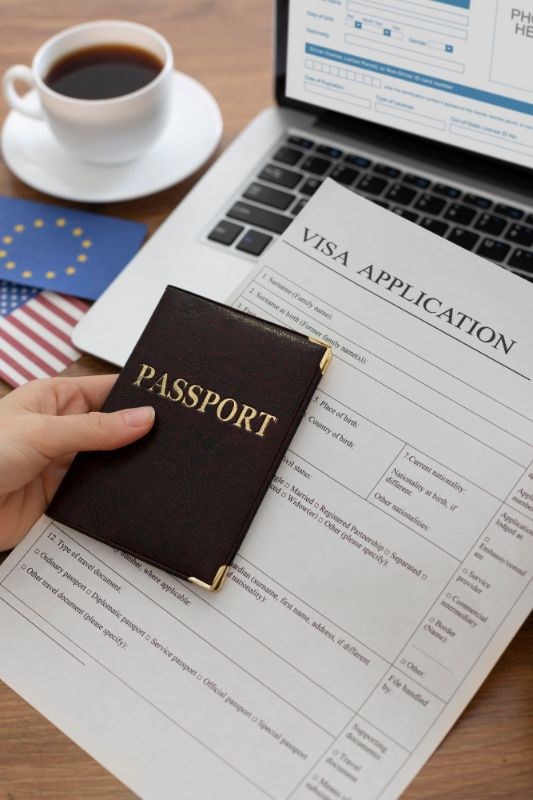How to Get a US Work Visa or Investor Visa
If you plan to work or invest in the United States, you may be able to obtain a US work visa or an investor visa.
Let discuss the process of applying for an US Work Visa or Investor Visa. The US government has a variety of paths for entering the country based on work or investment opportunities. Your occupation or business ventures may allow you to immigrate to the United States temporarily or permanently.
Professional workers and workers of extraordinary ability may qualify for certain types of work visas and investor visas.
At N400 Harbor Immigration Law, we have many years of experience helping individuals obtain the necessary documents to seek work or investment in the US. Explore the types of US work visas and investor visas or contact us to discuss your immigration needs.
Table of Contents
What Are Temporary Work Visas?
A temporary US work visa is a type of non-immigrant visa that grants temporary admission to the United States based on an applicant’s occupation.
Examples of temporary work visas include:
- E-1 Visa: Treaty Traders
- E-2 Visa: Treaty Investors
- E-2C Status: E-2 CNMI Investor Status (E2C)
- E-3 Visa: Specialty Occupation Workers from Australia
- EB-5 (E5) Visa: Immigrant Investor Program
- H-1B Visa: Specialty Occupations, DOD Cooperative Research and Development Project Workers, and Fashion Models
- H-1C Visa: Registered Nurse Working in a Health Professional Shortage Area
- H-2A Visa: Temporary Agricultural Workers
- H-2B Visa: Temporary Non-Agricultural Workers
- H-3 Visa: Nonimmigrant Trainee or Special Education Exchange Visitor
- I Visa: Representatives of Foreign Media
- L-1A Visa: Intracompany Transferee Executive or Manager
- L-1B Visa: Intracompany Transferee Specialized Knowledge
- O-1/O-2 Visa: Individuals with Extraordinary Ability or Achievement
- P-1A Visa: Athlete
- P-1B Visa: A Member of an Internationally Recognized Entertainment Group
- P-2 Visa: Individual Artist or Entertainer
- P-3 Visa: Cultural Artist or Entertainer, Group
- Q-1 Visa: Cultural Exchange
- R-1 Visa: Nonimmigrant Religious Workers
- TN NAFTA Visa: Qualified Business Professionals, NAFTA Members

Most of these visas require an employer to file a petition on behalf of the immigrant. Exceptions include treaty traders (E-1), treaty investors (E-2), and certain professionals from Australia (E-3).
Some of the most common temporary US work visas include the H-series work visas. The H-series of work visas includes H1-B visas, which are issued to people in specialty occupations. These occupations typically require specialized knowledge and a Bachelor’s degree or higher.
The H-2A and H-2B visas are issued to temporary, seasonal workers. The H-2A visa is for temporary agricultural workers while the H-2B visa is for temporary non-agricultural workers.
How to Obtain a US Work Visa
There are two separate paths for obtaining a US work visa, depending on your current situation. If you currently live outside the US and want to work in the country, you need to apply for a work visa through the US Department of State (DOS).
If you currently live in the US with a non-work visa, you may apply for a change of status or an adjustment of status. For example, if you have a student visa but recently received a job offer, you may qualify for a change of status based on your new occupation.
For those outside of the US, the steps involved in obtaining a US work visa include:
- Receive a job offer
- Your employer files a petition on your behalf
- Apply for a temporary nonimmigrant work visa
- Attend your US work visa interview




Requirements for US Work Visas
The requirements for US work visas depend on the type of visa and occupation. For example, H-1B applicants may need a bachelor’s degree in their respective fields.
Workers also need to come from an eligible country. The US Department of State maintains a list of eligible countries for certain types of visas, such as the H-2A visa for temporary agricultural workers. If you do not live in one of the included countries, you may not apply for the visa.
What Are Investor Visas?
An investor visa is granted to individuals looking to engage in commercial ventures that support the US economy.
The EB-5 Immigrant Investor Program is responsible for administrating investor visas. Applicants are called employment fifth preference (E5) immigrant investors or immigrant entrepreneurs.
The EB-5 program was created to help boost investment in the United States economy. The program was created in 1990 and sets aside a total of 10,000 investor visas each year for qualified individuals.
After receiving approval for the E5 program, investors may work toward receiving lawful permanent resident (LPR) status. The green card is initially issued with a two-year conditional period before the immigrant receives unconditional LPR status.
How to Obtain an Investor Visa
Applying for an E5 immigrant investor visa involves several steps:
- File Form I-526 – Immigrant Petition by Alien Entrepreneur
- Submit the appropriate fees and documents
- Complete a visa interview
- Receive your E5 investor visa
Obtaining an investor visa can be more complex compared to applying for a temporary US work visa. You need to submit various forms and documents to US Citizenship and Immigration Services (USCIS). Any errors or overlooked requirements could result in the denial of your application.
Requirements for Investor Visas
Immigrant entrepreneurs must provide documentation of their business plans and investments. Your new commercial enterprise needs to meet specific requirements related to job creation and capital investment.
Before filing a petition for a visa, you must invest a minimum of $1,000,000 in US businesses or $500,000 in targeted employment areas, such as rural areas. The activities that you invest in must generate at least 10 full-time jobs within 2 years.
The investment needs to be a for-profit business venture. It can be a sole proprietorship, partnership, holding company, joint venture, business trust, corporation, or limited liability company (LLC).
Receive Help With Your Visa Application
Whether you wish to obtain a work visa or an investor visa, we can help. N400 Harbor Immigration Law specializes in all types of immigration matters. We can walk you through the requirements and the steps involved in applying for your visa.
Applying for an investor visa is a major commitment, as it requires a large investment in a new commercial venture. At N400 Harbor Immigration Law, we have assisted many immigrant entrepreneurs with their path to launching successful business ventures in the US.
The steps involved in applying for a temporary US work visa can also be challenging for those that are new to the immigration process.
N400 Harbor Immigration Law can help decrease the risk of errors during the application process. We can help you avoid issues that may cause delays in your application.
If you need assistance applying for a US work visa or investor visa, do not hesitate to contact us. Schedule a consultation today.





